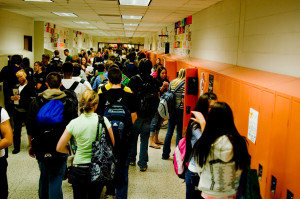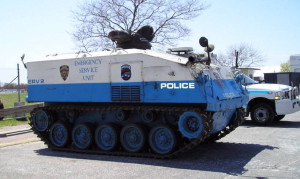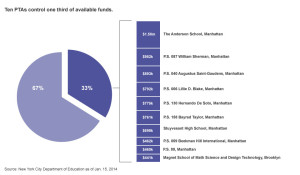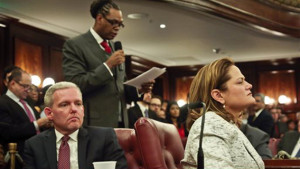
Lines to vote on Nov. 6 stretched out the door at P.S. 361 in Crown Heights, Brooklyn, and polling sites around the city. Photo: Ben Fried/Streetsblog
Public officials and good-government groups want the city’s Board of Elections to change how it trains and recruits the thousands of poll site workers that it deploys on Election Day.
During a City Council hearing on Wednesday, advocates and elected officials recounted the myriad problems that voters encountered on Election Day last month, including long lines, overcrowded polling sites that posed fire hazards, shortages of affidavit ballots, jammed ballot scanners and poll site workers who gave voters incorrect instructions.
While those who testified proposed an array of solutions to remedy what Committee on Governmental Operations chairperson Gale Brewer characterized as the Board of Elections’ “systemic” problems — issues that extend well beyond difficulties that resulted from Hurricane Sandy — most public officials and good government groups weighing in focused on the more than 30,000 temporary workers deployed to 1,200 polling sites on Election Day.
“I would argue that poll workers are a linchpin of an effective election,” said Alex Camarda, Director of Public Policy and Advocacy for the good-government group Citizens Union. “Unless we change the manner in which we recruit workers…we’ll never reach that level of quality.”
Many of those who testified said that conditions of the job needed to be improved in order to attract and retain workers. A poll worker’s shift can last for 18 hours or more, and the pay for the job has not increased in more than a decade — conditions that can deter candidates from signing up for the job.
“The Board of Elections is more or less constrained to use anyone that is willing and able to show up at a poll site,” said State Assemblymember Brian Kavanagh, who represents parts of Manhattan’s East Side.
To increase the number of applicants to serve as poll site workers, the board has called on Mayor Michael Bloomberg to sign an executive order to increase pay. Poll workers currently receive $200 and poll site coordinators currently receive $300; the board would like to see those numbers increased to $300 and $400 respectively.
Good-government groups and elected officials also suggested that lawyers, students and municipal workers be actively recruited as poll workers, and that workers be placed on split shifts. Some suggested that the training for poll site workers, which currently consists of one six-hour session, be transformed into a more engaging learning experience.
Doug Kellner, co-chair of the State Board of Elections, testified that in recent years the city Board of Elections has been tasked with recruiting more and more poll workers, a role that has historically been filled by local elected party officials known as district leaders. “The city has not been funding the Board of Elections to take up the slack,” he said, adding that the city board needed more money to implement any new programs.
“There would have to be more structural changes and clarity,” responded City Council Speaker Christine Quinn to Kellner, to “make sure those monies are spent well.”
In an interview, the deputy executive director of the Board of Elections, Dawn Sandow, said she agreed that more money is needed to change the way the board runs elections.
Prior to the 2012 elections, the board requested 104 new full-time permanent positions, including includes 83 supervisory, clerical, and office support posts as well as 23 voting system technicians. “Just those technicians on Election Day would have made a difference,” said Sandow.
Sandow wants additional funding to hire a private company to design an effective training program for poll site workers; she also wants to hire a firm to assess the layout of poll sites, much in the way consultants examine the layout of retail stores and amusement parks.
“You never realize you’re on line for 45 minutes at Disney,” she said.
Sandow stressed that while the board’s goal is to reduce the time that people wait in line, voters also sometimes need to bring a measure of patience to their civic duty.
“You want people to come in and vote and not wait in line,” she said. “However, these are the same people that are camping out overnight for an iPhone.”









